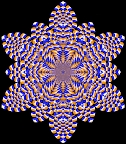Let's file these images under the category of things you don't see everyday. I borrowed these images from Eye of Science.
Resin cast of the urinary vessels of a kidney. The red structure shows the major and minor calyces which receive urine from different sections of the kidney; passing it first to the renal pelvisand then to the urethra.
Transmission electron micrograph (TEM) of a cluster of Escherichia coli bacteria, known as E. coli. They normally inhabit the intestines of humans or animals and are usually harmless. Under certain conditions E. coli may increase and cause infection. Serotypes of E. coli are responsible for gastroenteritis in children. In adults it causes "Traveler’s diarrhea" and is responsible for 80% of urinary tract infections. It is also the most used bacteria for genetic studies.
Magnification: 25.000 X.
Colored Scanning Electron Micrograph (SEM) of nylon hooks and loops in Velcro material. Used as a common fastener on clothes and shoes, Velcro is a nylon material formed into two different structures: one a nail- head-like surface, and the other a smooth surface made up of a series of loops. The loops are loosely woven strands among an otherwise tight weave. When the two surfaces are brought together they form astrong bond, but can still be pulled apart.
Magnification: 50 X.
Colored scanning electron micrograph (SEM) of an itch mite on the surface of the skin. In humans, this parasite causes scabies, an ailment typified by severe itching (especially at night), red papules and often secondary infection. The female mite tunnels in the skin to lay her eggs and the newly-hatched mites are passed easily from person to person by physical contact. The itching is caused by an allergic reaction to the mite's saliva or feces. Commonly infected areas are the groin, penis, nipples and the skin between the fingers. The condition is treated with hexachloropheneor benzyl benzoate creams.
Magnification: 300 X.









0 comments:
Post a Comment | Random Illusion